新概念英语第三册第16课
新概念第三册第16课课件
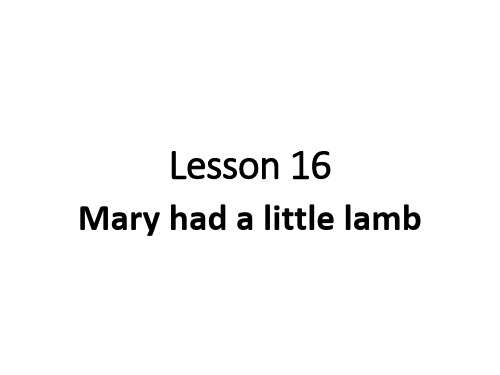
9. A valued adj.尊贵的, 尊重的, 宝贵的 worthwhile adj.值得做的 worthy adj.值得的, 配得上的 10. B tell sb.about sth. report sth. to sb. 11. C conversation对话 12. A go out of doors=go outside in the open air 在户外, 露天 inside out 里外反穿
• accuse sb. of doing(L10-L11) 指责某人做某事 • be ashamed of doing sth.(L13) 对...感到羞愧 • apologize to sb. for doing sth.(L13) 为做某事向某人道歉 • be astonished to do(L15) 做某事很震惊 • be dyed black(L16) 被染黑
2.Why did Dimitri get a surprise when he get outside? Dimitri was surprised to find that the lamb had turn white.
短语
• fetch sth.(L4) 取某物 • it is obvious that(L6) ...是很明显的 • set out to do(L8) 着手去做 • it would not prove difficult(L8) 是不难做到的
语言点
Aleko denied taking it ...(L11) deny doing sth. there is no denying that ... 很显然...
Ashamed of having acted so rashly(L13) 过去分词作状语 ashamed 感到羞愧 shamful 可耻的
新概念英语第三册课堂笔记:第16课
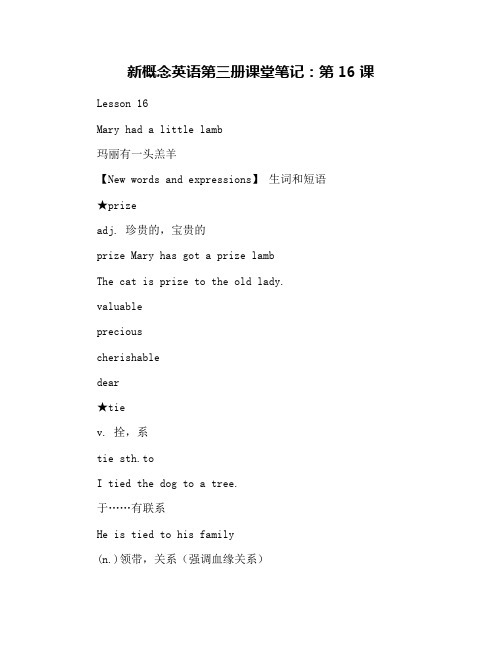
新概念英语第三册课堂笔记:第16课Lesson 16Mary had a little lamb玛丽有一头羔羊【New words and expressions】生词和短语★prizeadj. 珍贵的,宝贵的prize Mary has got a prize lambThe cat is prize to the old lady.valuablepreciouscherishabledear★tiev. 拴,系tie sth.toI tied the dog to a tree.于……有联系He is tied to his family(n.)领带,关系(强调血缘关系)★theftn. 偷盗行为,偷盗案He reports the theft to the police.★accusev. 指控accuse sb.of doing sth.accuse 比charge语义弱:accuse强调"严厉的指责",charge 强调"控告"★de nyv. 否认deny doing sth.He denied stealing the lamb.He denied the truth.deny sb. nothing :百依百顺He denies his wife nothing.deny oneself:克制自己On some occasions we must deny ourselves.★ashamedadj. 感到羞耻,惭愧be ashamed ofHe is ashamed of being a dustman.shameful:可耻的The theft is shameful.shameless:无耻的The thief is a shameless person.★apologizev. 道歉apologize to sb.(for sth.)(n.)apology★dyev. 染Dye the cloth blackListen to the tape then answer the question below.听录音,然后回答以下问题。
新概念英语第三册 Lesson 16 课件
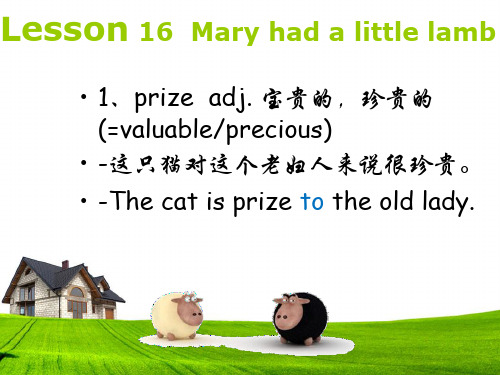
• While they were talking it began to rain and Dimitri stayed in Aleko's house until the rain stopped.
• dye v.染色 • -把头发染成黄色。 • -Dye the hair yellow. • hair dye • 染发剂 • dye house • 染坊 • n.染料
• -你们最好换上长袍。
• -you two better change into ropes. • - you two had better change into
Lesson 16 Mary had a little lamb
• 1、prize adj. 宝贵的,珍贵的 (=valuable/precious)
• -这只猫对这个老妇人来说很珍贵。 • -The cat is prize to the old lady.
• n.奖品,奖赏 • 一等奖 • the first prize • 诺贝尔奖 • the Nobel Prize • 诺贝尔医学奖 • the Nobel Prize for Medicine • 最佳摄影奖 • the prize for best photography • 最佳导演/男演员/女演员奖 • the prize for best director/actor/actress
• One evening, however, the lamb was missing. The rope had been cut, so it was obvious that the lamb had been stolen.
新概念三第16课原文

新概念三第16课原文新概念英语第三册第16课的原文如下:Lesson 16 The Sporting Spirit.Every year, in the spring, the Rugby football teams of Oxford and Cambridge meet one another in London. This is a very important event, for it is not only a great sporting occasion, but also a social event of the greatest importance. Many graduates, who have not seen one another for years, meet at this annual gathering. The game itselfis extremely rough and dangerous, but this seems to be part of its attraction. The players, most of whom are quite young, do not seem to mind this; indeed, they seem to enjoy it. They play with such enthusiasm and determination that they often receive injuries. This, however, does not worry them. On the contrary, it seems to please them. They take a pride in their injuries and are quite unconcerned about any pain they may suffer. They are proud of the scars on their faces and bodies and are quite happy to explain to you howthey came by them. It is not at all unusual to hear a player say, 'I got this scar when I broke my leg in the match against Cambridge' or 'This is the scar I got when I sprained my ankle in the match against Oxford.' They will then go on to tell you all about the incident in question. It is clear that they are extremely proud of their injuries and regard them as medals. They seem to think that the more scars they have, the better players they are. This is, of course, absurd, but it shows the great spirit of the game.以上就是新概念英语第三册第16课的原文。
新概念英语第三册课堂笔记第16课
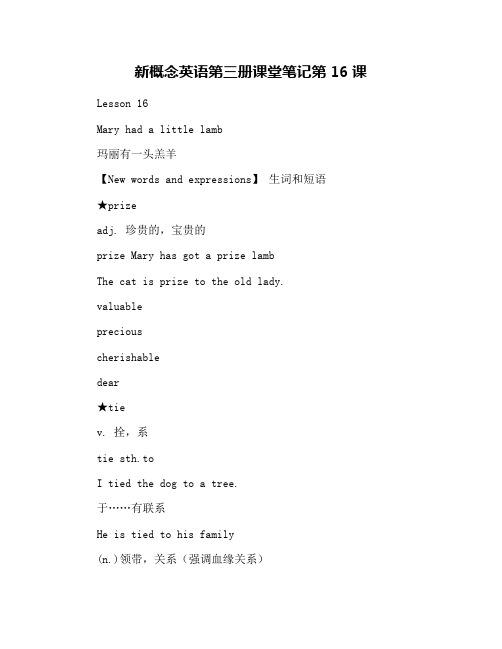
新概念英语第三册课堂笔记第16课Lesson 16Mary had a little lamb玛丽有一头羔羊【New words and expressions】生词和短语★prizeadj. 珍贵的,宝贵的prize Mary has got a prize lambThe cat is prize to the old lady.valuablepreciouscherishabledear★tiev. 拴,系tie sth.toI tied the dog to a tree.于……有联系He is tied to his family(n.)领带,关系(强调血缘关系)★theftn. 偷盗行为,偷盗案He reports the theft to the police.★accusev. 指控accuse sb.of doing sth.accuse 比charge语义弱:accuse强调"严厉的指责",charge 强调"控告"★de nyv. 否认deny doing sth.He denied stealing the lamb.He denied the truth.deny sb. nothing :百依百顺He denies his wife nothing.deny oneself:克制自己On some occasions we must deny ourselves.★ashamedadj. 感到羞耻,惭愧be ashamed ofHe is ashamed of being a dustman.shameful:可耻的The theft is shameful.shameless:无耻的The thief is a shameless person.★apologizev. 道歉apologize to sb.(for sth.)(n.)apology★dyev. 染Dye the cloth blackListen to the tape then answer the question below.听录音,然后回答以下问题。
(英音版)新概念英语第三册第16课:Mary had a little lamb
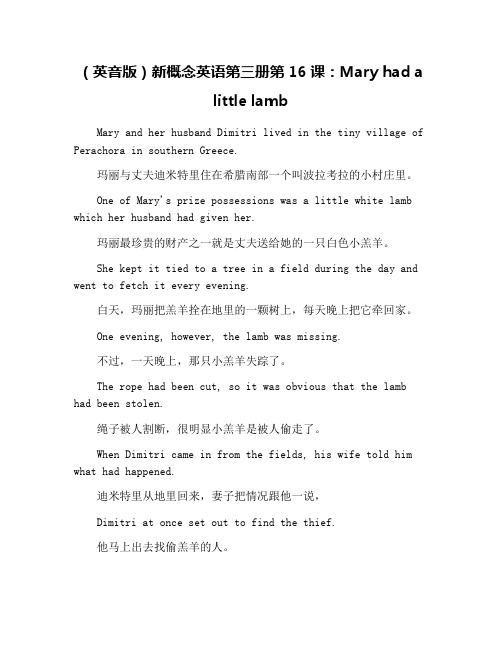
(英音版)新概念英语第三册第16课:Mary had alittle lambMary and her husband Dimitri lived in the tiny village of Perachora in southern Greece.玛丽与丈夫迪米特里住在希腊南部一个叫波拉考拉的小村庄里。
One of Mary's prize possessions was a little white lamb which her husband had given her.玛丽最珍贵的财产之一就是丈夫送给她的一只白色小羔羊。
She kept it tied to a tree in a field during the day and went to fetch it every evening.白天,玛丽把羔羊拴在地里的一颗树上,每天晚上把它牵回家。
One evening, however, the lamb was missing.不过,一天晚上,那只小羔羊失踪了。
The rope had been cut, so it was obvious that the lamb had been stolen.绳子被人割断,很明显小羔羊是被人偷走了。
When Dimitri came in from the fields, his wife told him what had happened.迪米特里从地里回来,妻子把情况跟他一说,Dimitri at once set out to find the thief.他马上出去找偷羔羊的人。
He knew it would not prove difficult in such a small village.他知道在这样一个小村庄里抓住小偷并不困难。
After telling several of his friends about the theft, Dimitri found out that his neighbour, Aleko, had suddenly acquired a new lamb.把失窃的事告诉几个朋友后,迪米特里发现他的邻居阿列科家突然多了一只小羔羊。
新概念英语第三册第16课
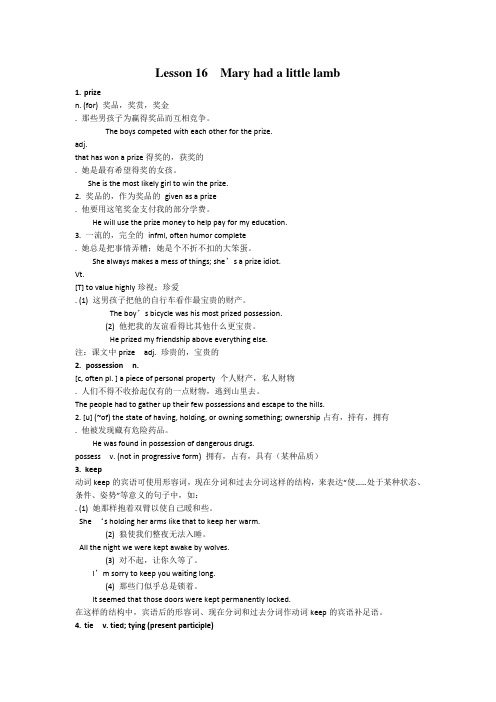
Lesson 16 Mary had a little lamb1.prizen. (for) 奖品,奖赏,奖金. 那些男孩子为赢得奖品而互相竞争。
The boys competed with each other for the prize.adj.that has won a prize得奖的,获奖的. 她是最有希望得奖的女孩。
She is the most likely girl to win the prize.2. 奖品的,作为奖品的given as a prize. 他要用这笔奖金支付我的部分学费。
He will use the prize money to help pay for my education.3. 一流的,完全的infml, often humor complete. 她总是把事情弄糟;她是个不折不扣的大笨蛋。
She always makes a mess of things; she’s a prize idiot.Vt.[T] to value highly珍视;珍爱. (1) 这男孩子把他的自行车看作最宝贵的财产。
The boy’s bicycle was his most prized possession.(2) 他把我的友谊看得比其他什么更宝贵。
He prized my friendship above everything else.注:课文中prize adj. 珍贵的,宝贵的2.possession n.[c, often pl. ] a piece of personal property 个人财产,私人财物. 人们不得不收拾起仅有的一点财物,逃到山里去。
The people had to gather up their few possessions and escape to the hills.2. [u] (~of) the state of having, holding, or owning something; ownership占有,持有,拥有. 他被发现藏有危险药品。
新概念英语第三册-Lesson16
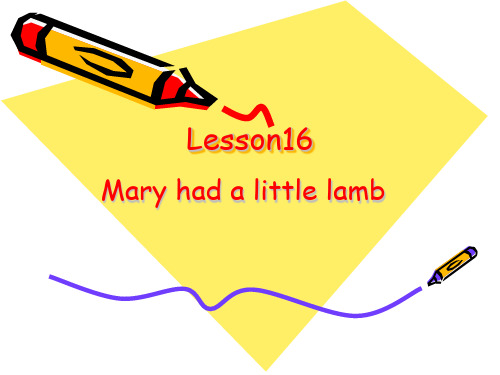
重点语法讲解
Homework
1.背诵课文L16, 2.抄写课文1英1汉 3.单词抄写L16, 4 英 1汉 4.完成配套练习册L16,
Thank you!
• 3.She kept it tied to a tree in a field during the day and went to fetch it every evening. • ★ Keep+宾语+宾补 • 使…处于某种状态 • ★ keep 后的宾语补足语可以是形容词、 介词短语wer questions
www.themegallery.co m
Company Logo
Note on the text 课文详解
www.themegallery.co m
Company Logo
• 1.Mary and her husband Dimitri lived in the tiny village of Perachora in southern Greece. • ★ in the tiny village of... • in the big city of Beijing. / in the beautiful city of Paris. • ★ in southern Greece • = in the south of Greece
• 8.Dimitri immediately went to Aleko's house and angrily accused him of stealing the lamb.He told him he had better return it or he would call the police. • ★ accused of • ★ or else… 否则…
新概念英语第三册逐句精讲第16课 Mary had a little lamb
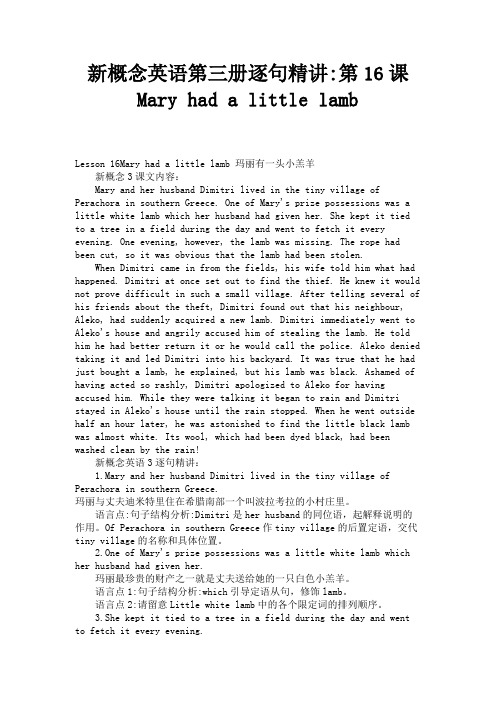
新概念英语第三册逐句精讲:第16课Mary had a little lambLesson 16Mary had a little lamb 玛丽有一头小羔羊新概念3课文内容:Mary and her husband Dimitri lived in the tiny village of Perachora in southern Greece. One of Mary's prize possessions was a little white lamb which her husband had given her. She kept it tied to a tree in a field during the day and went to fetch it every evening. One evening, however, the lamb was missing. The rope had been cut, so it was obvious that the lamb had been stolen.When Dimitri came in from the fields, his wife told him what had happened. Dimitri at once set out to find the thief. He knew it would not prove difficult in such a small village. After telling several of his friends about the theft, Dimitri found out that his neighbour, Aleko, had suddenly acquired a new lamb. Dimitri immediately went to Aleko's house and angrily accused him of stealing the lamb. He told him he had better return it or he would call the police. Aleko denied taking it and led Dimitri into his backyard. It was true that he had just bought a lamb, he explained, but his lamb was black. Ashamed of having acted so rashly, Dimitri apologized to Aleko for having accused him. While they were talking it began to rain and Dimitri stayed in Aleko's house until the rain stopped. When he went outside half an hour later, he was astonished to find the little black lamb was almost white. Its wool, which had been dyed black, had been washed clean by the rain!新概念英语3逐句精讲:1.Mary and her husband Dimitri lived in the tiny village of Perachora in southern Greece.玛丽与丈夫迪米特里住在希腊南部一个叫波拉考拉的小村庄里。
新概念第三册16课课文

Lesson 16 Mary had a little lamb玛丽有一头羔羊Mary and her husband Dimitri lived in the tiny village of Perachora in southern Greece.玛丽与丈夫迪米特里住在希腊南部一个叫波拉考拉的小村庄里。
One of Mary's prize possessions was a little white lamb which her husband had given her.玛丽最珍贵的财产之一就是丈夫送给她的一只白色小羔羊。
She kept it tied to a tree in a field during the day and went to fetch it every evening.白天,玛丽把羔羊拴在地里的一颗树上,每天晚上把它牵回家。
One evening, however, the lamb was missing.可是,一天晚上,那只小羔羊失踪了。
The rope had been cut, so it was obvious that the lamb had been stolen.绳子被人割断,很明显小羔羊是被人偷走了。
When Dimitri came in from the fields, his wife told him what had happened.迪米特里从地里回来,妻子把情况跟他一说,Dimitri at once set out to find the thief.他马上出去找偷羔羊的人。
He knew it would not prove difficult in such a small village.他知道在这样一个小村庄里抓住小偷并不困难。
After telling several of his friends about the theft, Dimitri found out that his neighbour, Aleko, had suddenly acquired a new lamb.把失窃的事告诉几个朋友后,迪米特里发出他的邻居阿列科家突然多了一只小羔羊。
新概念三第16课 Mary had a little lamb
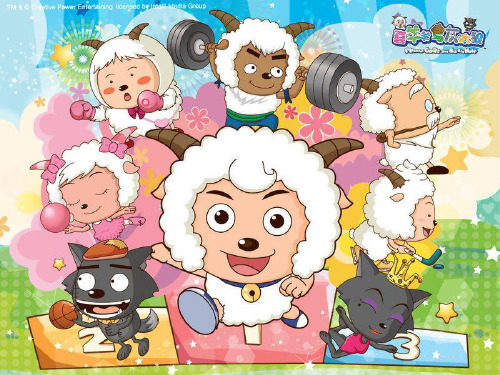
• We are nearly of a age. • These three cases are much of a
size.
Mary and her husband Dimitri lived in the tiny village of Perachora in southern Greece.
• in the tiny village of... • in the big city of Beijing. • in the beautiful city of Paris.
Mary and her husband Dimitri lived in the tiny village of Perachora in southern Greece.
Mary had a little lamb
Lesson 16
prize adj.珍贵的, 宝贵的
• The cat is prize to the old lady. • Valuable adj.有价值的, 贵重的 • Precious adj.珍贵的, 宝贵的 • Dear adj.昂贵的, 亲爱的
有求必应。 • deny oneself 克制自己
• On some occasions we must deny ourselves. 在某些场合我们必须克制自己
deny v.否认
• There is no denying the fact that he is honest.
• It cannot be denied that honesty is the best policy.
dye v. 染(dying dyed)
新概念英语第三册第16课-Mary had a little lamb
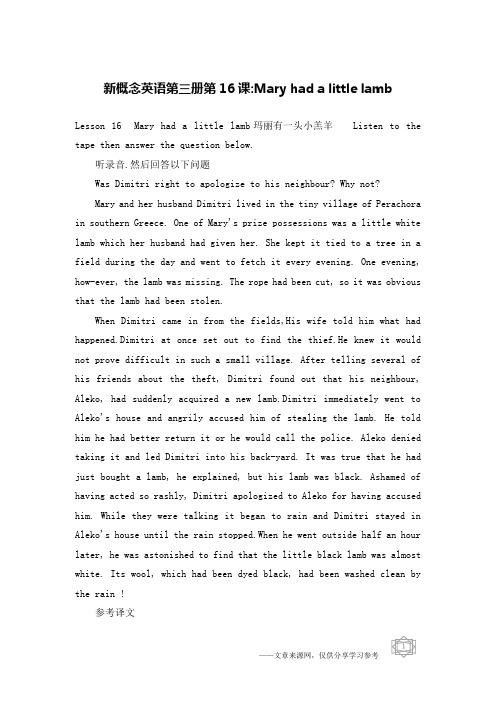
新概念英语第三册第16课:Mary had a little lambLesson 16 Mary had a little lamb玛丽有一头小羔羊Listen to the tape then answer the question below.听录音.然后回答以下问题Was Dimitri right to apologize to his neighbour? Why not?Mary and her husband Dimitri lived in the tiny village of Perachora in southern Greece. One of Mary's prize possessions was a little white lamb which her husband had given her. She kept it tied to a tree in a field during the day and went to fetch it every evening. One evening, how-ever, the lamb was missing. The rope had been cut, so it was obvious that the lamb had been stolen.When Dimitri came in from the fields,His wife told him what had happened.Dimitri at once set out to find the thief.He knew it would not prove difficult in such a small village. After telling several of his friends about the theft, Dimitri found out that his neighbour, Aleko, had suddenly acquired a new lamb.Dimitri immediately went to Aleko's house and angrily accused him of stealing the lamb. He told him he had better return it or he would call the police. Aleko denied taking it and led Dimitri into his back-yard. It was true that he had just bought a lamb, he explained, but his lamb was black. Ashamed of having acted so rashly, Dimitri apologized to Aleko for having accused him. While they were talking it began to rain and Dimitri stayed in Aleko's house until the rain stopped.When he went outside half an hour later, he was astonished to find that the little black lamb was almost white. Its wool, which had been dyed black, had been washed clean by the rain !参考译文玛丽与丈夫迪米特里住在希腊南部一个叫波拉考拉的小村庄里。
新概念Book3 Lesson 16
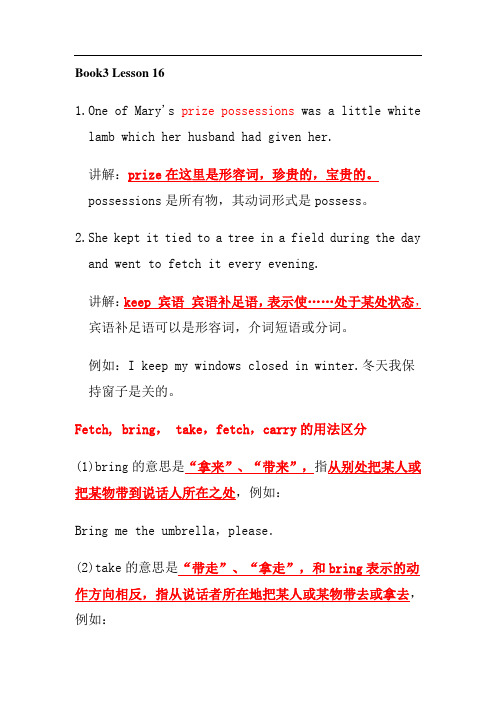
Book3 Lesson 161.One of Mary's prize possessions was a little white lamb which her husband had given her.讲解:prize在这里是形容词,珍贵的,宝贵的。
possessions是所有物,其动词形式是possess。
2.She kept it tied to a tree in a field during the day and went to fetch it every evening.讲解:keep 宾语宾语补足语,表示使……处于某处状态,宾语补足语可以是形容词,介词短语或分词。
例如:I keep my windows closed in winter.冬天我保持窗子是关的。
Fetch, bring, take,fetch,carry的用法区分(1)bring的意思是“拿来”、“带来”,指从别处把某人或把某物带到说话人所在之处,例如:Bring me the umbrella,please.(2)take的意思是“带走”、“拿走”,和bring表示的动作方向相反,指从说话者所在地把某人或某物带去或拿去,例如:Will you please take the child to his mother?(3)fetch的意思是“去拿来”、“去取来”,指去别处把某人或某物带到说话人所在之处,有个往返过程,相当于go and bring,例如:Fetch a doctor at once.(4)carry的意思是“携带”、“搬迁”“传送“,指用人力或交通工具把一件东西从一个地方带到另一个地方,本身不含特定的方向,还可以指抱小孩,例如:The box is too heavy for me to carry.3.One evening, however, the lamb was missing. The rope had been cut, so it was obvious that the lamb had been stolen.讲解:(1)it was obvious that很显然……在这里是it做形式主语(2)missing丢失,相当于Lost。
新概念英语第三册第16课
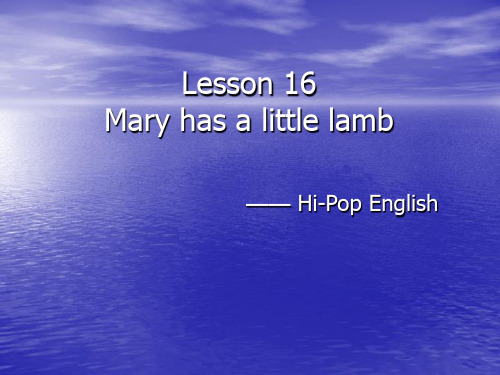
shame n. 羞耻,惭愧; v. 使丢脸, 使羞愧
eg. Have you no shame? 你就没有羞耻心吗? • to one’s shame 令某人感到羞愧的是… • ashamed adj. 感到羞愧的,惭愧的 • be ashamed to do sth. 耻于做… ; 不好意思做… eg. You should be ashamed to tell such lies. I am ashamed to say so. • be ashamed of=be ashamed of oneself for sth. “由于…而感到羞耻 (一般指内在的人或事物,如自己)” eg. You really ought to be ashamed of that.(=You really ought to be ashamed of yourself for that. ) be ashamed for sth. 为…而感到可耻(一般指外在的人或事物,如 他人) Eg. I felt ashamed for your attitude to your parents. shameful adj. 可耻的 shameful behaviour shame sb into doing sth. 使某人羞愧不得不做…
- 1、下载文档前请自行甄别文档内容的完整性,平台不提供额外的编辑、内容补充、找答案等附加服务。
- 2、"仅部分预览"的文档,不可在线预览部分如存在完整性等问题,可反馈申请退款(可完整预览的文档不适用该条件!)。
- 3、如文档侵犯您的权益,请联系客服反馈,我们会尽快为您处理(人工客服工作时间:9:00-18:30)。
Lesson 16 Mary had a little lamb1.prizen. (for) 奖品,奖赏,奖金e.g. 那些男孩子为赢得奖品而互相竞争。
The boys competed with each other for the prize.adj.1.that has won a prize得奖的,获奖的e.g. 她是最有希望得奖的女孩。
She is the most likely girl to win the prize.2. 奖品的,作为奖品的given as a prizee.g. 他要用这笔奖金支付我的部分学费。
He will use the prize money to help pay for my education.3. 一流的,完全的infml, often humor completee.g. 她总是把事情弄糟;她是个不折不扣的大笨蛋。
She always makes a mess of things; she’s a prize idiot.Vt.[T] to value highly珍视;珍爱e.g. (1) 这男孩子把他的自行车看作最宝贵的财产。
The boy’s bicycle was his most prized possession.(2) 他把我的友谊看得比其他什么更宝贵。
He prized my friendship above everything else.注:课文中prize adj. 珍贵的,宝贵的2.possession n.1.[c, often pl. ] a piece of personal property 个人财产,私人财物e.g. 人们不得不收拾起仅有的一点财物,逃到山里去。
The people had to gather up their few possessions and escape to the hills.2. [u] (~of) the state of having, holding, or owning something; ownership占有,持有,拥有e.g. 他被发现藏有危险药品。
He was found in possession of dangerous drugs.possess v. (not in progressive form) 拥有,占有,具有(某种品质)3.keep动词keep的宾语可使用形容词,现在分词和过去分词这样的结构,来表达“使……处于某种状态、条件、姿势”等意义的句子中,如:e.g. (1) 她那样抱着双臂以使自己暖和些。
She ‘s holding her arms like that to keep her warm.(2) 狼使我们整夜无法入睡。
All the night we were kept awake by wolves.(3) 对不起,让你久等了。
I’m sorry to keep you waiting long.(4) 那些门似乎总是锁着。
It seemed that those doors were kept permanently locked.在这样的结构中,宾语后的形容词、现在分词和过去分词作动词keep的宾语补足语。
4.tie v. tied; tying (present participle)1. [T] to fasten with a cord, rope, etc[用绳、带等] 系、拴、扎、捆e.g. (1) 把这标签系到你的手提箱上。
Tie this label onto your suitcase.(2) 她把马拴在一棵树上。
She tied her horse to a tree.tie……to……把……拴/系在……2. [T] to fasten by drawing together and knotting把[带子等] 打结,系上e.g. 你学会系自己的鞋带了吗?Could you tie your own shoe laces yet?n.1.also 又作necktie esp. AmE 领带,领结2. a cord, string, etc. used for fastening sth.(捆扎东西的)绳子,带子3.[usua. pl.] something that unites; bond联系,关系e.g. (1) 亲属关系family ties(2) 友好关系ties of friendship5.fetch vt.1.拿来e.g. (1) 我不想让你去给我拿任何东西。
I don’t want you to fetch anything for me.(2) 我又去拿了一个杯子。
I went and fetched another glass.注:fetch是去某处去拿某物,而bring是将某物带到你所在的地方。
试比较:(1)如果你去厨房,请顺便给我带杯水过来,行吗?If you are going to the kitchen, would you mind bringing me a glass of water please?(2) 请给我倒杯水。
Please fetch me a glass of water.而take 则是将某物从此处拿到另一处e.g. 把这杯水拿给你父亲。
Take this glass of water to your father.2. 请来,接e.g. 每天下午他都在她回家的路上接她。
Every afternoon he fetches her on her way home.6.missing adj. that cannot be found; not in the proper or expected place; lost找不到的,丢失的e.g. 这个报告遗漏了一些重要的数字。
Some important figures are missing from this report.lost adj.1.that cannot be found by the owner遗失的,丢失的e.g. 走失的狗a lost dog2. unable to find the way迷路的e.g. 我在雪中迷了路。
I got lost in the snow.3. no longer possessed or existing失去的,不复存在的e.g. (1) 逝去的青春one’s lost youth(2) 失传的艺术a lost art4. not used, obtained, or won 错过的;未好好利用的;没能赢得的e.g. 错过的机遇a lost opportunity7.missing and lost注:这两个动词都可以表示“丢失”,“失去”的意思。
lose 语气较强,一般指失去不易找回。
miss 有“发现失去”的意思,指东西找不到,但有找到的希望。
e.g. (1) The man lost a leg in the war.那个人在战争中失去了一条腿。
(2) She missed her child in the street.她在街上把孩子丢了。
在很多情况下两者可互相替换。
e.g. (1) I have lost my umbrella.我把伞丢了。
(2) On my way home, I missed my umbrella.回家路上,我发觉我的伞不见了。
作定语时,lose 用过去分词形式,miss 用现在分词形式。
例如:e.g. 他们立即出发去寻找丢失的女孩。
They set out to look for the missing girl at once.miss 可以表示“想念”的意思,lose则不能。
e.g. 你不在时我们都会想念你的。
We shall all miss you when you go away.8.obvious adj.(to) easy to see and understand; clear; which must be recognized明显的,明白的,显著的,显而易见的e.g.每个人都明白他在撒谎。
It was obvious to everyone that he was lying.adv. obviously明显地,显著地,显而易见地9.set out1.to leave a place and begin a journey出发;动身;启程e.g. 他们动身踏上最后一段行程。
They set out on the last stage of their journey.2. to begin a job, task, etc. with a particular aim or goal (怀着目标) 开始工作,展开任务e.g. (1) 她一心努力要打破世界纪录。
She set out to break the world record.(2) 他们实现了既定的目标。
They succeeded in what they set out to do.10.it would not prove difficult 是不难做到的prove 是连系动词,作“证明是”讲,本句子与it would not be difficult相同11.theft n.[c; u] (an example of) the crime of taking someone else’s property from a place; stealing偷窃,盗窃;窃案e.g. 这座大楼保了火险和失窃险。
The building has been insured against fire and theft.thief n. (pl. thieves) a person who steals, esp. without using violence (尤指不使用暴力的) 小偷,(窃)贼12.acquire v.[T] to gain or come to possess, esp. by one’s own work, skill, or action, often over a long period of time (尤指通过个人的工作、技艺、行动等而) 取得,获得,得到e.g. (1) 我设法弄到了两张音乐会的票。
I managed to acquire two tickets for the concert.(2) 公司最近在伦敦市中心弄到了新的办公室。
The company has recently acquired new offices in central London.13.accuse v.[T (of) ] to charge (someone) with doing wrong or breaking the law指责,谴责;控告,告发e.g. (1) 他被控犯了谋杀罪。
